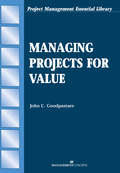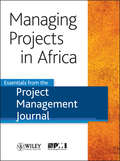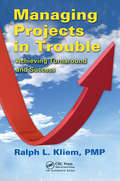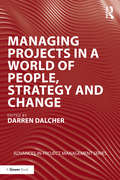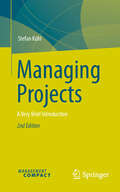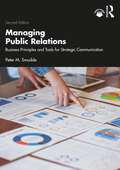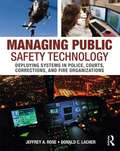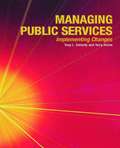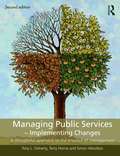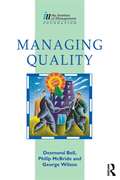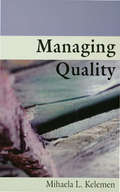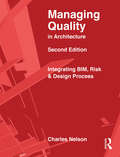- Table View
- List View
Managing Projects Within the Existing Organization
by Aaron J. Shenhar Dov DvirThis chapter shows you how to apply the diamond model for project management in your organization and how to include this adaptive approach as part of your existing project management procedures. It also covers how to perform project planning, handle project uncertainty and risk, and improve overall project activity efficiency.
Managing Projects as Investments: Earned Value to Business Value (Systems Innovation Book Series)
by Stephen A. DevauxDue to a lack of appreciation of the true economic identity of projects, techniques and metrics that could hugely improve project selection and performance are not being used. This book provides insights and innovative techniques drawn from more than a quarter century of experience. These techniques have the potential to transform program and project management from the current haphazard application of various techniques and metrics to an incisive and integrated approach where programs and projects are managed for the crucial economic and financial implications that are at the essence of every project investment.
Managing Projects at Work
by Gordon WebsterThis book is written for all managers, in any function, who are tasked with delivering projects at work. It is of particular interest to those managers who have to deal with small- to medium-sized projects in addition to their usual responsibilities. Straightforward and user friendly, this book takes the reader through a series of steps which results in the effective delivery of a project. Managing Projects at Work breaks down into two stages. By the end of stage one the reader will know how to build a ’Defensible Plan’ for successful project implementation. This process, which follows a step-by-step sequence, draws out in a unique way all the resources and support needed for an effective project delivery. The outcome is a confident project manager who can justify and secure what is needed for the stress-free implementation of the project. Stage two deals with implementing the ’Defensible Plan’ under proper control, through motivated and well-led people. Gordon Webster’s approach suits projects as diverse as introducing new systems or procedures, launching a new product, opening a new branch, factory or department; even organizing a conference or moving offices. Its practical methodology has been developed as a result of working over many years with managers whose projects had gone off track, usually for the same reasons. From these observations the unique and entirely effective ’Defensible Plan’ and its implementation were born. By adopting this approach readers can build in success from the beginning and see consistent project delivery, along with control of their working life.
Managing Projects for Value
by John C. Goodpasture PMPWith a clear focus on how business objectives determine project value, this book explains how to use an "investment-based" perspective to integrate finance, risk management and strategic planning. You'll develop workflows that overcome constraints of time, cost and scheduling as you benefit from new tools that relate processes directly to business goals: the project balance sheet and the time-centric earned value system. In addition, a new goal decomposition methodology gives you the best chance of getting projects started - and getting them accomplished successfully.
Managing Projects in Africa: Essentials from the Project Management Journal (Project Management Journal)
by Project Management JournalThis special issue of the Project Management Journal presents a collection of six articles on managing projects in Africa. Providing a window into the important project activity taking place there, these articles extend both the empirical and theoretical understanding of the African project context and contribute to improving practice. Each article makes a unique contribution to either our understanding of the African project context or project management in general, and sometimes to both. After an introduction to the African project context at the start of the 21st century, the articles explore: three different countries as well as multinational projects; for-profit, public sector, and development aid projects; infrastructure and information and communication technology; project governance as well as project management; and partnering challenges.
Managing Projects in Developing Countries
by John W. Cusworth T. R. FranksCovers the concepts, systems and skills of project management, identifying the three major elements of organisations: implementation, planning and procurement.
Managing Projects in Research and Development
by Ron BasuResearch and Development is the vehicle by which organizations and economies create opportunity, innovation and secure a stream of future products and services.These outcomes are all critically important sources of sustainability in a world that is changing faster than most companies can keep up.The challenge behind them is the fundamental unpredictability of R&D; which is why effective project management is so important. Ron Basu's Managing Projects in Research and Development explains how and why project management can provide a means of helping to plan, organise and control multi-disciplinary research activities without stifling innovation. Combining research with practical examples and experience from a career that has included blue chip organizations such as GSK, GlaxoWellcome and Unilever, Ron Basu offers a rigorous guide to the fundamentals of R&D project management including project lifecycle management, risk management, cost, time quality and other success measures as well as the keys to operational excellence in this complicated world.
Managing Projects in Trouble: Achieving Turnaround and Success (Systems Innovation Book Ser.)
by PMP, Ralph KliemWhether you use budget, schedule, quality, or other criteria, the statistics by think tanks, institutes, associations, and other trade organizations all point to one inescapable conclusion: your project has a greater chance of getting into trouble than staying out of it.Based on the lessons learned by the author during a quarter of a century of lea
Managing Projects in a World of People, Strategy and Change (Advances in Project Management)
by Darren DalcherProject management is at a crossroads: There is a pressing need to rethink the approaches used in initiating, managing and governing projects, programmes and change initiatives. The aim of this book is to progress the dialogue around project practice by shifting the focus from instrumental methods and prescriptive techniques towards a context-sensitive consideration of people, strategy and change. Projects are initiated to deliver agreed outputs that can be translated into meaningful outcomes capable of satisfying the wishes and expectations for improvement and development. Yet, people, strategy and change, which are largely ignored by the conventional bodies of knowledge, are clearly central to the sustainable and enduring success of projects, efforts and initiatives. The volume brings together some of the best writing by leading authorities on key topics including trust, ethics, people, psychology, requirements, project performance, audits, uncertainty, anti-fragility, strategic initiatives, governance, change management and commercial management. The collection offers an invaluable new resource for informed managers looking to engage with the latest thinking and research.
Managing Projects with Smart Technologies: Developing Technological Competency for Project Managers (ISSN)
by Bon-Gang Hwang Jasmine Ngo Hanjing ZhuWith a focus on project managers (PMs) in the construction industry, this book addresses the impact of smart technology applications on project management and examines how technologically competent PMs can be developed for successfully managing and delivering projects with smart technologies.The book assesses the changes to the knowledge and skillsets required to manage projects with smart technologies; develops a Technological Competency Framework to improve PM competency when managing projects with smart technologies; and develops a Knowledge-Based Technological Competency Analytics and Innovations System to assess and improve the technological competency of PMs and provide recommendations to improve their competency.Managing Projects with Smart Technologies is ideal for PMs and academics in the areas of construction project management, engineering, architecture, and infrastructure and anyone involved in the technical training of professionals in these areas.
Managing Projects with Uncertain Outcomes: Employing an Entrepreneurial Mindset
by Rita Gunther Mcgrath Ian MacmillanOnce you have made the decision to pursue a strategic opportunity, the danger isn't over--new and changing business models imply new customers, competitors, and competences. For example: how do you assess and manage a project's progress when the outcomes are highly uncertain? This chapter outlines an approach to developing leading indicators of the progress of your project, to help you figure out where things are going at the earliest possible time, when the least amount of resources have been expended. This chapter is excerpted from "The Entrepreneurial Mindset: Strategies for Continuously Creating Opportunity in an Age of Uncertainty."
Managing Projects: A Very Brief Introduction
by Stefan KühlThe linear, goal-oriented approach to projects that is so popular in management literature is only appropriate if you are dealing with well-defined problems. For projects that address poorly defined problems, however, the principles of classic project management don&’t work; project managers attempt in vain to maintain a linear approach, even if targets, people affected and framework conditions cannot be determined precisely. We propose a fundamentally different approach based on current organizational theory: to start out with experiments, without predetermined conclusions. Projects are not evaluated by comparing the current status to the target, but rather by assessing whether stagnation has been overcome, conflicts put aside, and shared understanding about new opportunities has been created. Project groups and steering committees are not set up at all. Power &“games&” are harnessed and put to use, rather than prohibited.
Managing Psychosocial Hazards and Work-Related Stress in Today’s Work Environment: International Insights for U.S. Organizations
by Ellen Pinkos CobbToday’s evolving world of work makes it imperative for employers to manage psychosocial hazards (PSH) and risks leading to work-related stress. This book contains essential, general and country-specific information and templates for the successful management of hazards so as to prevent psychological harm in the workplace. Acknowledged as global issues affecting all workers and industries, PSHs are work factors that have the potential to lead to physical or psychological injury and stress, relating to how work is designed, organized, and managed, and to work relationships and interactions. This book advances the idea that management of PSH and psychological health and safety is part of today’s responsible and ethical employers’ duty of care for employees, and that United States employers should recognize this responsibility. Easy to follow, this guide presents comprehensive information on addressing PSH, discussing measures taken internationally (laws, guidance, and resources from Europe, Canada, Mexico, Australia, and Japan), as well as a new global standard on psychological health and safety at work. Practitioners and students in the fields of management, occupational health and safety, human resource management, ethics and compliance, occupational health psychology, and organizational psychology will come away with a deeper understanding of the importance of PSH and their management.
Managing Public Pension Plans: Decisions, Challenges, and Reforms (Routledge Public Budgeting and Finance)
by Gang Chen Trang Hoang Carol EbdonThis book provides an in-depth explanation of public pension plan management and the decision-making processes surrounding pension policies within state and local governments in the United States. It addresses the intricate balance between securing retirement benefits for public employees and ensuring the fiscal sustainability of pension systems and their sponsoring governments. The book begins with an introduction to the purpose and significance of public pension systems, establishing a foundation for understanding key pension decisions. Using a logic model framework, the authors assess how environmental factors, stakeholders, and legal constraints shape decisions in pension management. The book identifies five core goals for public pension management — benefit sufficiency, cost affordability, funding sustainability, asset management efficiency, and governance quality — emphasizing the relationships among these objectives.Detailed chapters cover investment policies, actuarial processes, and the design of benefits and contributions, explaining the financial and actuarial bases necessary for sound pension decisions. Pension reform efforts, including the transition from defined benefit plans to defined contribution, cash-balance, and hybrid plans, are examined in depth, highlighting the reasons for reforms and analyzing their impacts on the employees and employers. The book concludes with ten takeaways for effective pension plan management and addresses emerging challenges such as fiscal pressures, inflation, and changing demographics. With practical implications grounded in research, this book serves as an essential resource for pension board members, pension system administrators, government officials, legislators and their staff, professionals, researchers, and students involved in public pension plan management.
Managing Public Relations: Business Principles and Tools for Strategic Communication, 2e
by Peter M. SmuddeThe second edition of Managing Public Relations introduces students to the key concepts and practices involved in the day-to-day running of a PR operation, whether it is a company department, an independent agency, or any organized group focused on PR. The book’s unique approach places the PR function within the broader context of an organization, equipping students with the essential business knowledge, perspective, and skills needed when starting out in their careers. This second edition has been fully updated throughout and includes: • Current examples and testimonials from across the globe, as well as updated "Executive Viewpoints." • Expanded content on strategic planning, budgeting, and financial statements. • Detailed commentary on topics relevant to the modern workplace, including remote management. • Consideration of diversity, inclusion, equity, and access within PR. • Additional content on the use of analytics and measuring return on investment (ROI). • Updated online material, including an Instructor’s Manual that incorporates problem-based questions, example assignments, and activities. A highly practical and comprehensive guide, this textbook should be essential reading for advanced undergraduate and postgraduate students studying public relations management, strategic communications and marketing management.
Managing Public Relations: Business Principles and Tools for Strategic Communication, 2e
by Peter M. SmuddeThe second edition of Managing Public Relations introduces students to the key concepts and practices involved in the day-to-day running of a PR operation, whether it is a company department, an independent agency, or any organized group focused on PR. The book’s unique approach places the PR function within the broader context of an organization, equipping students with the essential business knowledge, perspective, and skills needed when starting out in their careers. This second edition has been fully updated throughout and includes: Current examples and testimonials from across the globe, as well as updated "Executive Viewpoints" Expanded content on strategic planning, budgeting, and financial statements Detailed commentary on topics relevant to the modern workplace, including remote management Consideration of diversity, inclusion, equity, and access within PR Additional content on the use of analytics and measuring return on investment (ROI) Updated online material, including an Instructor’s Manual that incorporates problem-based questions, example assignments, and activities A highly practical and comprehensive guide, this textbook should be essential reading for advanced undergraduate and postgraduate students studying public relations management, strategic communications and marketing management.
Managing Public Safety Technology: Deploying Systems in Police, Courts, Corrections, and Fire Organizations
by Jeffrey A. Rose Donald C. LacherDivided into four sections—public safety agencies, key issues like interoperability and cybercrime, management skills, and emerging trends like the transfer of military technologies to civilian agencies, Managing Public Safety Technology illustrates how essential managing technology is to the success of any project. Based on the authors’ years of experience dealing with information systems and other tools, this book offers guidance for line personnel, supervisors, managers, and anyone dealing with public safety technology. Designed for current or future public safety personnel, especially those in management, Managing Public Safety Technology can also be used for undergraduate and graduate public safety management and leadership programs.
Managing Public Services - Implementing Changes: A Thoughtful Approach to the Practice of Management
by Terry Horne Tony L. DohertyFocusing on change as a constant factor in the management of any organization, this informative book helps the student and practitioner to develop the skills and knowledge they require to underpin the work of a modern service manager in rapidly-changing public sector organizations - whether publicly owned, privately managed or sub-contracted. Taking a distinctive approach, emphasizing management and organizational learning as keys to organizational success, this introductory text is solidly practical and is supported by strong pedagogical features including: case studies review questions illustrative vignettes. This comprehensive text has been specifically designed and developed to meet the needs of students studying public services management at undergraduate, certificate diploma and postgraduate level. It allows the reader to develop transferable skills in thinking and learning as they work through the book and gives greater awareness of the benefits of continuous learning for staff and managers.
Managing Public Services - Implementing Changes: A thoughtful approach to the practice of management
by Simon Wootton Terry Horne Tony L. DohertyThe work of a manager in a service organisation is not the same as the work of a manager in an organisation that manufactures goods. Managing Public Services, Implementing Changes – A Thoughtful Approach 2e, is for students and managers who intend to work in a service organisation whether it is owned publicly of privately. This book concentrates on how managers can change things for the better and explains ‘why’ as well as ‘how’. The second edition has been fully updated to address challenges facing public services with new material on managing cuts, managing risk, managing innovation, producing funding applications, Lean Management and process review. A new chapter on managing social enterprise and generating social capital has also been added. This text is both solidly practical and theoretically challenging and is supported by strong pedagogical features including: case studies and illustrative vignettes from public service managers working in Europe, Asia, Australia and the US; exercises and review questions. Students will develop learning skills that enable them to transfer their learning from one situation to another and thinking skills that enable them adapt the way that they apply their learning as circumstances change. This comprehensive text has been specifically designed and developed to meet the needs of students studying public services management at undergraduate and postgraduate level. It allows the reader to develop transferable skills in thinking and learning as they work through the book and gives greater awareness of the benefits of continuous learning for staff and managers.
Managing Public Services: Making Informed Choices
by Irvine LapsleyThis book explores innovations in public management, including establishing a corporate vision, strategizing an organization and change management. Chapters provide a valuable frame of reference for the 21st-century manager of public services by assessing the renewal of existing practices such as strategic costing, performance management, digitization and procurement and innovations in management practices, including branding, Lean Management, resilience and risk management. The book suggests that, as the management of public services is imbued with financial, social, economic and political uncertainties, management needs to be flexible and responsive to new ideas and practices to fulfil its purpose. This book ultimately supports the reflective manager, those who think about their job and are open to new ideas on how their job can be done better, by revisiting existing practices and examining innovations in public management. Enriched with real-life cases and thought-provoking discussion questions, this is the ideal textbook for reflective, open-minded advanced students of public management and actual, or aspiring, reflective managers in public services.
Managing Quality
by George Wilson Des Bell Philip Mcbride Nial CairnsManaging Quality will help you understand the role of TQM within your organization and how you can best implement it. The authors show you: *how to understand quality management systems, tools and techniques *how to use them *how to assess the cost of quality *how to promote quality amongst your team members *how to lead and motivate your team *how to measure progress towards total quality. It is based upon the Management Charter Initiative's Occupational Standards for Management NVQs and SVQs at Levels 4 & 5. It is particularly suitable also for managers on Certificate and Diploma in Management programmes, including those accredited by BTEC.
Managing Quality
by Mihaela L KelemenManaging Quality provides a comprehensive review and critical analysis of quality management discourses and techniques by drawing on a number of management disciplines such as operations management, HRM, organizational behaviour, strategy, marketing and organization theory. The book: - introduces readers to key concepts and issues in quality management - provides an overview of both managerial and critical perspectives on quality management - presents the 'wisdom' of quality management gurus - documents the way quality is pursued in manufacturing, service and public sector organizations - compares and contrasts hard and soft technologies of quality management - critically reviews the rhetoric of TQM and business process re-engineering (BPR) - examines the consequences of quality on stakeholders - scrutinizes the language of quality management - documents the mundane nature of quality managemnt practices through the use of real life case studies Managing Quality is an up-to-date and student-centered treatment of quality management that will be essential reading for undergraduate students of operations and quality management. It will also be extremely relevant to all MBA students, and useful reading for students of HRM, organization theory and the sociology of organizations.
Managing Quality Cultural Tourism (Heritage: Care-Preservation-Management)
by Priscilla BonifaceManaging Quality Cultural Tourism is an authoritative look at how to manage cultural tourist sites to best meet the needs of the visitors, the presenters and the site itself. As cultural tourism increases the management of heritage sites becomes more complex. Priscilla Boniface addresses these crucial management issues using a marketing approach to identify the needs of all concerned. This volume is specifically aimed at professionals and students of leisure, tourism and heritage management. It provides an invaluable background to cultural tourism and then focuses on some important issues involved with managing a heritage site - education, entertainment and preservation - and considers appropriate ways of dealing with the needs of the tourist, the presenters and the cultural site. Managing Quality Cultural Tourism suggests a way forward for cultural tourism. It is an indispensable tool for all involved in tourism and heritage industries.
Managing Quality Cultural Tourism (Heritage: Care-Preservation-Management)
by Priscilla BonifaceManaging Quality Cultural Tourism is an authoritative look at how to manage cultural tourist sites to best meet the needs of the visitors, the presenters and the site itself. As cultural tourism increases the management of heritage sites becomes more complex. Priscilla Boniface addresses these crucial management issues using a marketing approach to identify the needs of all concerned.This volume is specifically aimed at professionals and students of leisure, tourism and heritage management. It provides an invaluable background to cultural tourism and then focuses on some important issues involved with managing a heritage site - education, entertainment and preservation - and considers appropriate ways of dealing with the needs of the tourist, the presenters and the cultural site.Managing Quality Cultural Tourism suggests a way forward for cultural tourism. It is an indispensable tool for all involved in tourism and heritage industries.
Managing Quality in Architecture: Integrating BIM, Risk and Design Process
by Charles NelsonCompletely revised throughout for this second edition, Managing Quality in Architecture addresses the new ISO 9001 standards after the significant 2015 revision. ISO 9001 is the global standard for quality, and firms certified under the 2008 edition have three years to upgrade their quality systems to the new Standard. This book helps architects, engineers and other designers working in the built environment to develop appropriate quality systems that meet the requirements of the international Standard. Importantly, the 2015 Standard integrates risk management with quality, something that earlier versions did not. Risk is an extremely important factor in professional design practice, and this important element is fully explored in the new edition. Similarly, the role of BIM in quality management is addressed as an integral part of practice. International contributions from the USA and Australia provide expertise in each topic, and case studies from the USA, Japan, Australia, New Zealand and the United Nations Office of Project Services provide easy-to-follow illustrations of the important areas to understand. The focus is completely practical, rather than theoretical, affording readers a concise picture of how the issues of excellence and quality performance flow across every aspect of design practice.



